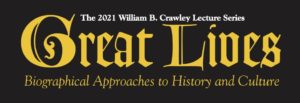
The William B. Crawley Great Lives Lecture Series continues on Thursday, March 11 at 7:30 p.m. with nonviolent resistance leader Mohandas K. Gandhi, presented by Professor of Communication and Chair of the Department of Communication and Digital Studies Anand Rao. The Synergy Periodontics and Implants Lecture.
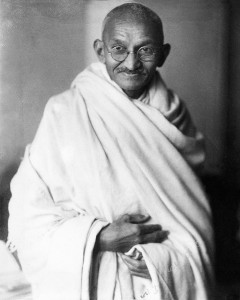
Mohandas K. Gandhi
Because of restrictions on public gatherings on campus, the entire series of 18 lectures will be pre-recorded and delivered electronically, through Zoom Webinars, with closed captioning available. Although the presentations will be taped in advance, there will still be a live Q&A session following the online debut of each lecture, in which the speaker will be available to answer questions submitted by audience members.
Once called a ‘half-naked fakir’ by Winston Churchill, Mohandas K. Gandhi was more widely known as Mahatma Gandhi, the man who led India to independence in 1947. Gandhi is typically remembered as he was in his later years, in sandals and dhoti leading protests and engaging in hunger strikes as he took on the British Empire. As with all great lives, Gandhi’s is a study in contrasts, and any study of his life, and his success as a leader of India, must include an understanding of his formative years as a boy in India, as a law student in London, and as a lawyer in South Africa. It is through this analysis that we can see how he became so instrumental to both Indian independence and our own Civil Rights movement.
Other upcoming lectures include Renaissance artist Artemisia Gentileschi, presented by Professor of Art History Marjorie Och; and playwright Lillian Hellman, presented by Professor of Theatre Gregg Stull. To learn more about Great Lives and view past and upcoming lectures, please visit https://www.umw.edu/greatlives/.

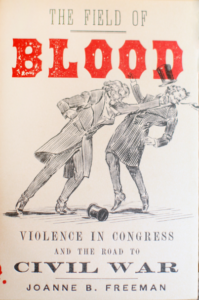 Missing UMW’s celebrated Great Lives lecture series? Coronavirus cut this season short, but you can catch pre-recorded episodes on C-SPAN. Acclaimed author Joanne Freeman kicks off the three-part series by discussing her book, Field of Blood, which recovers the long-lost story of physical violence on the floor of the U.S. Congress.
Missing UMW’s celebrated Great Lives lecture series? Coronavirus cut this season short, but you can catch pre-recorded episodes on C-SPAN. Acclaimed author Joanne Freeman kicks off the three-part series by discussing her book, Field of Blood, which recovers the long-lost story of physical violence on the floor of the U.S. Congress.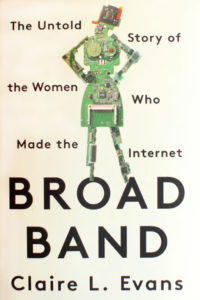 C-Span’s American History TV will air the Great Lives lecture from Tuesday, March 10, “Female Internet Inventors,” by Claire Evans, author of Broad Band: The Untold Story of the Women Who Made the Internet. Titled “Women and Computers,” the program will air at the following times:
C-Span’s American History TV will air the Great Lives lecture from Tuesday, March 10, “Female Internet Inventors,” by Claire Evans, author of Broad Band: The Untold Story of the Women Who Made the Internet. Titled “Women and Computers,” the program will air at the following times: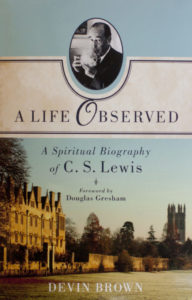 The Great Lives series continues on Thursday, March 12, with C.S. Lewis, featuring Devin Brown, author of A Life Observed: A Spiritual Biography of C.S. Lewis. The Coldwell Banker Elite Lecture.
The Great Lives series continues on Thursday, March 12, with C.S. Lewis, featuring Devin Brown, author of A Life Observed: A Spiritual Biography of C.S. Lewis. The Coldwell Banker Elite Lecture.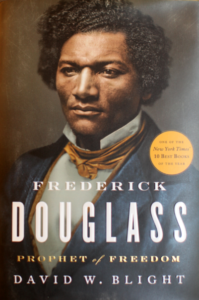 The 17th season of the William B. Crawley Great Lives Lecture Series continues on Thursday, Feb. 27, with abolitionist, orator and author Frederick Douglass, with David W. Blight, author of The New York Times bestseller Frederick Douglass: Prophet of Freedom. This series is open to the public free of charge and no admission tickets are required. Programs begin at 7:30 p.m. in Dodd Auditorium in George Washington Hall. Each lecture concludes with an audience Q&A session with the speaker and a book-signing. The Synergy Periodontics and Implants Lecture.
The 17th season of the William B. Crawley Great Lives Lecture Series continues on Thursday, Feb. 27, with abolitionist, orator and author Frederick Douglass, with David W. Blight, author of The New York Times bestseller Frederick Douglass: Prophet of Freedom. This series is open to the public free of charge and no admission tickets are required. Programs begin at 7:30 p.m. in Dodd Auditorium in George Washington Hall. Each lecture concludes with an audience Q&A session with the speaker and a book-signing. The Synergy Periodontics and Implants Lecture.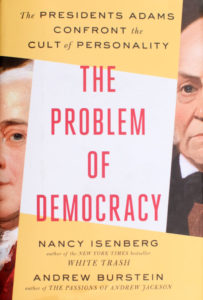 The Great Lives series continues on Tuesday, Feb. 25 with John Adams and John Quincy Adams, presented by Nancy Isenberg and Andrew Burstein, authors of the book, The Problem with Democracy: The Presidents Adams Confront the Cult of Personality. The Parrish Snead Franklin Simpson, PLC Lecture.
The Great Lives series continues on Tuesday, Feb. 25 with John Adams and John Quincy Adams, presented by Nancy Isenberg and Andrew Burstein, authors of the book, The Problem with Democracy: The Presidents Adams Confront the Cult of Personality. The Parrish Snead Franklin Simpson, PLC Lecture. The 17th season of the William B. Crawley Great Lives Lecture Series continues on Tuesday, Feb. 18, with a look at the brilliant and enigmatic scientist and disability icon Stephen Hawking, with biographer Kitty Ferguson. This series is open to the public free of charge and no admission tickets are required. Programs begin at 7:30 p.m. in Dodd Auditorium in George Washington Hall. Each lecture concludes with an audience Q&A session with the speaker and a book-signing. The Dovetail Cultural Resources Group Lecture.
The 17th season of the William B. Crawley Great Lives Lecture Series continues on Tuesday, Feb. 18, with a look at the brilliant and enigmatic scientist and disability icon Stephen Hawking, with biographer Kitty Ferguson. This series is open to the public free of charge and no admission tickets are required. Programs begin at 7:30 p.m. in Dodd Auditorium in George Washington Hall. Each lecture concludes with an audience Q&A session with the speaker and a book-signing. The Dovetail Cultural Resources Group Lecture.